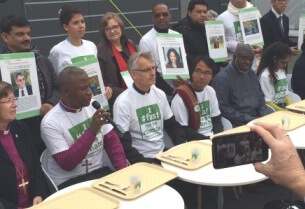“The Anglican Alliance gives thanks for this significant step on the journey to climate justice,” said the Revd Andy Bowerman, Anglican Alliance Co-Executive Director.
“As UN Secretary-General Ban Ki-moon said, the Paris Agreement marks the first time that ‘every country in the world has pledged to curb emissions, strengthen resilience and join in common cause to take common climate action’.”
The ambitious agreement is a triumph of hope, Andy commented.
“To quote Jim Wallis, founder of the Washington DC-based Sojourners community, ‘hope is believing in spite of the evidence, and then watching the evidence change’. Advent reminds us that it is always good to hope.”
Despite the many disappointments, the failures of previous climate conferences as negotiations broke down along lines of self-interest, people did not lose hope, he said.
Andy was among the pilgrims who, collectively, walked and cycled the distance of more than seven times around the world in the hope of urging world leaders to common action. He carried with him voices of communities in the Anglican Communion that experience each day the devastating impact of climate change.
He noted that the pilgrims’ hope has been borne out but the journey to transform lives continues.
“Now we need to keep up the momentum to ensure that governments actually begin to take action now to improve the lives of vulnerable communities,” he remarked.
The commitment to develop better technologies in the future is one example, Andy said. While this is obviously crucial, steps need to be taken immediately to cut carbon emissions using existing technologies.
In a reflection available in English, Spanish and Portuguese, Dr David Morales, a member of the Anglican Communion Environment Network, took a look at these issues from his perspective in Latin America.
He noted that the agreement initiates a movement towards the gradual decarbonization of the economy and industry, with priority given to the transition to low carbon energy. David believes that Paris has created “a new global climate paradigm”.
Despite the achievements in Paris, advocacy will however continue to be vital, including on financing the Agreement’s commitments. How the international community – and especially those countries with the highest carbon emissions – will pay for the plans is not sufficiently articulated, Andy Bowerman noted. “We must continue to pray and call for action.”
Bishop Nick Holtam, Bishop of Salisbury and the Church of England’s lead on the environment, agreed. “What matters now is that governments actually deliver a low carbon future – the transparency of accountability and process of review will be what ensures that happens. This looks like real progress…but we are still at an early stage on the journey.”
The Anglican Communion began this journey many years ago. Its understanding of mission holds a deep commitment to care for the environment, as expressed in its fifth Mark of Mission: “To strive to safeguard the integrity of creation and to sustain and renew the life of the earth.”
Earlier this year, bishops from across the Anglican Communion met in Cape Town, hosted by Archbishop Thabo Makgoba, Primate of the Anglican Church of Southern Africa. Their joint statement laid out the theological foundations for climate justice.
Archbishop Thabo also travelled to Paris to speak at a series of events around COP21 and to join others who have been fasting for climate justice. After meeting people from the Pacific Islands, Archbishop Thabo reflected in his blog: “In that part of God’s world, climate change is about the right to life, not just cold, technocratic issues. People are suffering and need help. Temperatures must be contained through a binding agreement as well as ethical and moral tools.”
Churches are called to be pilgrims on this ongoing journey, according to the Archbishop of Canterbury.
“The global church – extraordinarily led on the issue of climate change by Pope Francis and the Ecumenical Patriarch – must be a key partner in tackling climate change. As the Body of Christ, his church is called to be incarnational. Each of us has a role to play, if we are to help achieve what has been agreed in Paris,” said Archbishop Justin Welby.
The Alliance will continue to serve as a platform for the Communion to come together to work at building a more just and sustainable world, Andy underlined.
“Our hope is in the One who hears the cry of the poor and of Creation. And having seen that transformation can occur, we can continue in hope and thanksgiving, trusting in God,” he said, echoing the words of a Pray4COP21 reflection.
“May God continue to fill us with hope.”
Photo: Archbishop Thabo Makgoba at a climate fast at the Paris COP21 meeting. Credit: Anglican Church of Southern Africa
———
Further reading
Reflection by Dr David Morales, Episcopal Anglican Church of Brazil (IEAB) and Anglican Communion Environment Network: Achievements and Challenges of the Paris Agreement | Conquistas y Desafíos del Acuerdo de Paris | Conquistas e Desafios do Acordo de Paris

